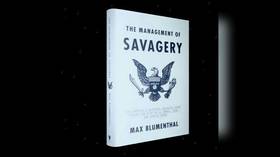Caving in to groupthink? Journalist flip-flops on ‘best book’ on US imperialism by Max Blumenthal

British journalist Grace Blakeley gave a glowing review of fellow reporter Max Blumenthal’s new book on US foreign policy, only to retract her comments a day later claiming she had been “made aware” of his “apologism for Assad.”
Blakeley initially raved about Blumenthal’s book, ‘The Management of Savagery’, a look at how US imperialism fuels terrorism and ultra-nationalism around the world. She even called it “the best book I've read all year” and described its contents as an “excoriating indictment of US, British and French imperialism in the Middle East.”
But the impressed journalist had a sudden change of heart on Monday and deleted the tweet. She then informed her followers that she had been informed of Blumenthal’s “apologism” for Syrian President Bashar Assad.
It's just come to my attention that someone has screenshotted a tweet that I deleted the other day about a book I read - The Management of Savagery by Max Blumenthal. I praised the book before deleting the tweet after being made aware of the author's apologism for Assad 1/ https://t.co/uaNg4JEGcd
— Grace Blakeley (@graceblakeley) June 10, 2019
It seems that ex-Trotskyist writer James Bloodworth had taken a screenshot of Blakeley's original tweet and attempted to shame her with a thread condemning Blumenthal as “pro-Assad, pro-Maduro, pro-Putin,” warning that there was “literally nothing redeemable” about him.
Blumenthal’s wrongthink is evidently a serious crime in the eyes of Bloodworth, who didn’t bother to provide any evidence of Blumenthal’s alleged “pro-Assad” writings. But Blakeley instantly took Bloodworth’s Twitter smears at face value, caved to pressure, and denounced a fellow writer.
The furor prompted other writers to weigh in, with journalist Aaron Maté wondering how Blumenthal’s work could so quickly go from the “best book of the year” to the trash heap all “because a Twitter smear artist falsified the author’s views.” In another tweet, Maté said the episode was a “window into how bullying & groupthink shape discourse on issues like Syria.”
Wow. You called it “the best book I’ve read all year.” The book contains, extensively, the author’s actual views on Syria. Now you’re retracting your endorsement of “the best book I’ve read all year” because a Twitter smear artist falsified the author’s views on Syria? 🤯
— Aaron Maté (@aaronjmate) June 10, 2019
Writer Katie Halper told Blakeley she shouldn't “cave to the pressure” to denounce Blumenthal, arguing that the smear tactic was just an attempt to create “guilt by association.”
Don't cave to the pressure to denounce a writer. You'll note that people never point to something Blumenthal has written. They just smear. It's a smear tactic and it works on a lot of people. It's a scary guilt by association thing.
— Katie Halper (@kthalps) June 10, 2019
Investigative reporter Asa Winstanley tweeted in bafflement at how a smear “by a blue-tick nobody on Twitter is better evidence” than Blakeley's reading of the entire book with her own eyes.
But some wondered whether Blakeley had even read the book, since if she had, it should have given her a clear view of Blumenthal’s opinions on Syria without the input from Twitter.
Blumenthal himself wondered, if he really was an “apologist” for Assad, why Blakeley hadn’t managed to detect that on the pages of his book.
It’s come to my attention that pundits seeking respectability in Western media reflexively self censor in the face of organized neocon pressure and thereby allow them to set the debate. Funny how this one didn’t detect any “apologism for Assad” on the pages of my book. https://t.co/NbqUISE4N4
— Max Blumenthal (@MaxBlumenthal) June 10, 2019
Journalist Bryan MacDonald didn't mince his words, saying Blakeley probably thought better of praising the book because it might have a negative effect on “her status” among mainstream UK and US media elites.
Let’s be honest. She thought praising @MaxBlumenthal’a book would effect her status in US/UK mainstream media. So, she backtracked. And, in doing so, actually made things worse for herself. Obsessives like the smear artist concerned can’t be placated, or reasoned with.
— Bryan MacDonald (@27khv) June 10, 2019
If you like this story, share it with a friend!














